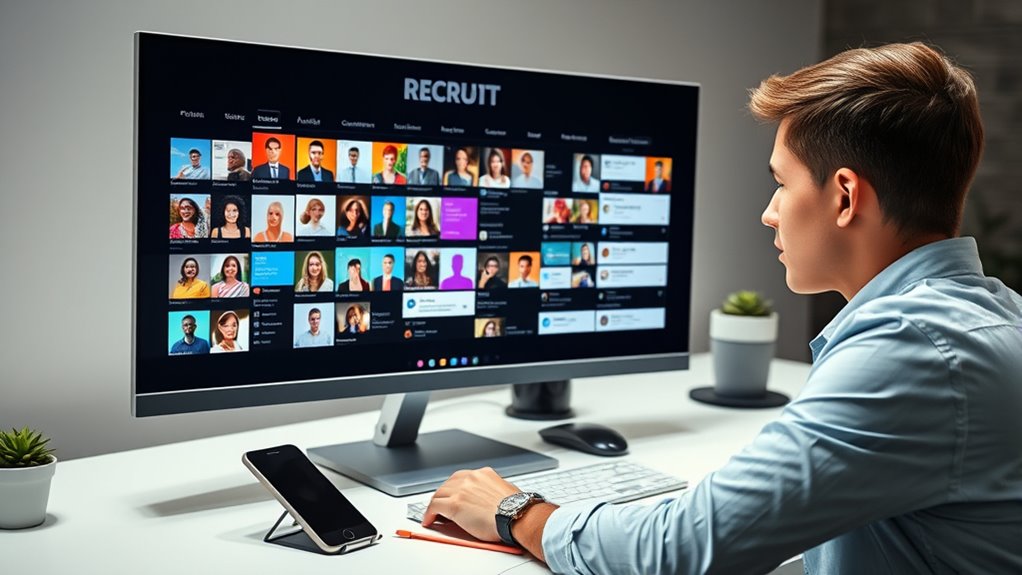Recruiters often review your social media activity to get a sense of your personality, values, and professionalism beyond your resume. They look at publicly available content like posts, photos, and comments to assess cultural fit and verify your application details. However, this practice raises privacy concerns, as personal opinions, beliefs, and private messages can be scrutinized unfairly. To learn how to navigate these potential pitfalls and protect your online presence, keep exploring.
Key Takeaways
- Recruiters analyze public social media profiles to assess personality, professionalism, and cultural fit for the company.
- They may review content like posts, photos, and comments to verify application details and gauge values.
- Social media activity can influence hiring decisions, but it risks bias and misinterpretation of private or sensitive information.
- Employers often use automated tools that might misjudge or overlook context, leading to unfair assessments.
- Job seekers should manage their online presence carefully to avoid sharing content that could negatively impact their chances.

Have you ever wondered how employers evaluate your online presence during the hiring process? Social media screening has become a standard part of many companies’ recruitment strategies, giving employers a window into your life beyond your resume. They look at your posts, photos, comments, and interactions to get a sense of your personality, values, and professionalism. But this practice raises important questions about privacy concerns and ethical implications. As a job seeker, it’s essential to understand that your online activity can profoundly influence your chances of landing a position, whether intentional or not.
Employers often justify social media screening as a way to assess cultural fit and verify information on your application. However, the lines between professional and personal life can blur, leading to concerns about privacy. When employers review your social media profiles, they may stumble upon content that isn’t relevant to your job skills but nonetheless influences their perception of you. This can include political views, religious beliefs, or personal opinions that you might consider private. The ethical implications become even more complicated when employers use this information to make hiring decisions. Is it fair to judge someone based on their social media activity if it doesn’t directly relate to their job qualifications? Many argue that such practices can lead to biased hiring and discrimination, especially if decisions are influenced by factors protected by law, like religion or ethnicity.
Social media screening blurs personal and professional boundaries, risking bias and discrimination in hiring decisions.
Additionally, social media screening can sometimes cross ethical boundaries. Employers might access private messages or photos that aren’t meant for public viewing, raising serious privacy concerns. The line between public and private information isn’t always clear-cut, and what’s considered appropriate to scrutinize in a professional context isn’t universally agreed upon. Some companies use software to automate the process, which can lead to inaccuracies or misinterpretations. For example, an innocent joke or a controversial opinion shared in a private group could be taken out of context and unfairly harm your chances. This raises the question of whether it’s ethical for employers to judge candidates based on potentially outdated or irrelevant information.
While social media screening can provide insights that aren’t visible on a resume, it’s essential for both employers and candidates to navigate this practice carefully. As a job seeker, you should be aware of your online footprint and think twice before posting content that could be misinterpreted. For employers, balancing the desire to learn about candidates with respect for privacy and ethical standards is critical. Ultimately, social media screening is a tool—one that should be used thoughtfully, with awareness of its potential pitfalls and moral considerations.
Frequently Asked Questions
Do Employers Check Social Media for All Job Applicants?
Many employers do check social media for some or all applicants, but it varies. They often do so to assess your character and professionalism, raising privacy concerns and ethical considerations. While not all companies screen everyone, be aware that your online presence can influence their decision. To avoid misunderstandings, keep your profiles professional and private, knowing that social media scrutiny is a common part of modern hiring.
How Accurate Are Social Media Screening Tools?
Think of social media screening tools as a crystal ball—sometimes clear, sometimes clouded. Their accuracy depends on the algorithm’s skill, but it’s not perfect. You might worry about privacy concerns, yet these tools can miss nuances or misjudge context. So, while they offer a glimpse, they aren’t foolproof. Relying solely on them risks overlooking the real you, whose online world is more complex than a simple scan.
Can Social Media Activity Affect Existing Employees’ Evaluations?
Your social media activity can impact your evaluations, especially if it raises privacy concerns or ethical considerations. Employers might scrutinize your online presence to assess professionalism or behavior outside work. While it’s tempting to share freely, remember that your posts could influence your standing at your job. Be mindful of what you post, as it can affect perceptions and evaluations, even for existing employees, highlighting the importance of respecting privacy boundaries.
What Are Candidates’ Rights Regarding Social Media Screening?
Imagine you’re in the wild west of the internet—your social media is your frontier. You have rights regarding social media screening, including privacy rights that protect your personal info. Employers must follow legal compliance, meaning they can’t discriminate or invade your privacy unjustly. Before screening, they should get your consent and only review public content. You can also request to see what they consider and challenge unfair judgments.
How Can I Improve My Online Presence for Job Prospects?
To improve your online presence for job prospects, focus on building a strong personal branding that highlights your skills and professionalism. Regularly update your profiles with positive content, showcase your achievements, and engage thoughtfully with industry-related topics. Manage your online reputation by removing or privatizing any controversial or unprofessional posts. Consistency across platforms helps convey a polished image, making you more attractive to recruiters and boosting your chances of landing your desired role.
Conclusion
Think of your online presence as a digital handshake—first impressions matter. Just like Sarah’s chances slipped away after a casual photo surfaced, recruiters are constantly judging your story through your posts. Remember, your social media is your personal billboard—what you share can open doors or slam them shut. Stay mindful of your digital footprint; your future opportunities depend on the online image you craft today. Make it count.









